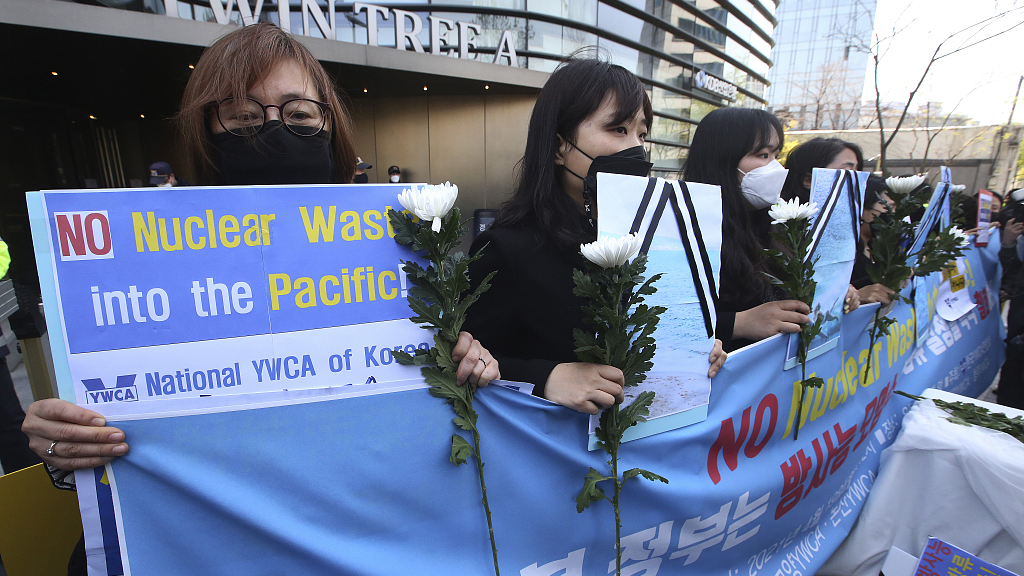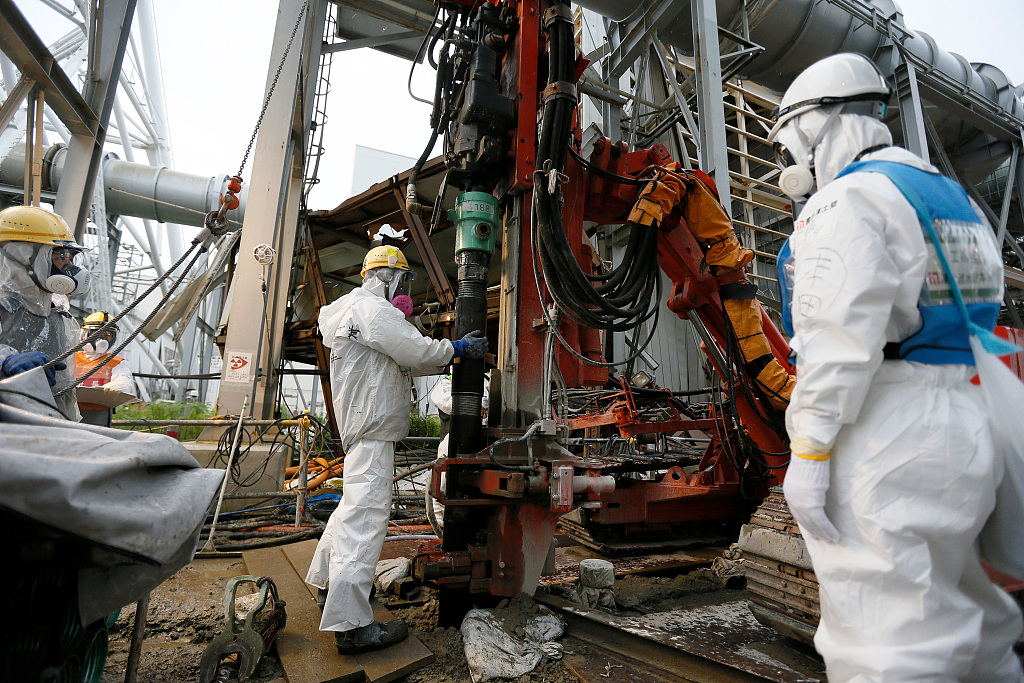
People staged a rally to denounce the Japan government's decision on Fukushima wastewater, in front of a building which houses Japanese embassy in Seoul, South Korea, April 19, 2021. /CFP
People staged a rally to denounce the Japan government's decision on Fukushima wastewater, in front of a building which houses Japanese embassy in Seoul, South Korea, April 19, 2021. /CFP
Editor's Note: Zhou Wenxing is assistant professor at the School of International Studies, Nanjing University and former Asia Fellow at John F. Kennedy School, Harvard University. He writes extensively on comparative politics and international relations, with an emphasis on the Taiwan issue and China-U.S. relations. The article reflects the author's opinions, and not necessarily the views of CGTN.
Today marks one year since the Japanese government announced to discharge 1.25 million tons wastewater from the Fukushima nuclear power plant into the Pacific Ocean in about two years. Since the Yoshihide Suga cabinet made this decision in April 2021, the newly-elected Prime Minister Fumio Kishida had emphasized in October that year that the release couldn't be delayed, suggesting the new cabinet's continuity of the controversial decision.
Now half a year has passed, and there is no signal showing that the Kishida cabinet would change the decision, despite deep concerns from local residents, governments and citizens in neighboring countries, and international organizations. It is important, and necessary, to discuss the reasons why Japanese government insists on dumping nuclear-contaminated water into sea at this critical moment.
The first factor is the Japanese government's scientific assessment of the treated contaminated water. It believes that the processed wastewater is not harmful and therefore could be released to sea. As argued by the former Prime Minister Yoshihide Suga in 2021 when he announced to discharge the water, the government had ensured the "safety levels of the [contaminated] water" before it decided to do so. He emphasized that the government would "do our utmost to keep the water far above safety standards."
A more realistic factor that Japanese government has to take into account is money. It is estimated that the direct financial damage from a natural disaster in 2011, which triggered the Fukushima Daiichi nuclear crisis, reached as high as $360 billion. In addition, the Japanese government planned to spend nearly $500 million to contain leaks of radioactive water at the Fukushima nuclear power plant.
As the wastewater continues to accumulate at a rate of about 170 tons a day, Japan is confronted with greater pressure, both spending more money and storing more wastewater. This poses a growing challenge to the government as the country suffers from a likely economic stagnation.
The Japanese government's ill-considered decision won support from the governments of the U.S., the UK and France, another factor reinforcing Japan's determination on the issue. The message from U.S. State Secretary Antony Blinken that "We thank Japan for its transparent efforts" in disposing of the radioactive water just further encouraged Japan to stand its ground more firmly on its decision.
While the U.S. government may have had the same "scientific assessment" of the treated water as the Japanese government did, it is certain that the U.S. showed its support to its Japanese ally more likely out of its own strategic calculations. However, the Japanese government has to pay more attention to negative messages from the international community rather than enjoy the positive ones from its allies should it seek its status as a so-called great power and "normal" country, a goal Japanese politicians have been pursuing since the end of the World War II.
Japanese government may achieve a Pyrrhic victory if it releases wastewater as planned. Some countries are discontented with its decision to release water without consulting with them, notably such coastal countries that will be deeply affected as China and South Korea. What's more, the Japanese government is determined to push forward this plan regardless of a widespread opposition from these countries. A petition against Japan on the issue launched by an international organization had received around 184,000 signatures in a short period of time last April.

Building a frozen underground wall around the crippled reactor buildings at Tokyo Electric Power Co.'s (Tepco) Fukushima Daiichi nuclear power plant in Okuma, Fukushima Prefecture, Japan, July 9, 2014. /CFP
Building a frozen underground wall around the crippled reactor buildings at Tokyo Electric Power Co.'s (Tepco) Fukushima Daiichi nuclear power plant in Okuma, Fukushima Prefecture, Japan, July 9, 2014. /CFP
The Japanese government also faces opposition from its nationals, particularly environmentalists and those who live on fishing. Before the decision was made by the government, an Asahi Shimbun survey found that 55 percent respondents opposed it. A vast majority of voters feared that the discharged water may hurt the local seafood.
These concerns were confirmed by some leading international organizations. Greenpeace, a non-governmental international organization dedicated to confronting the systems that threaten the environment, argues that the processed wastewater with small amount of tritium among other radionuclides is still detrimental to both nature and human beings. Japan's decision would therefore threaten not only the seafood but also biodiversity at large.
Some independent experts from the UN also expressed deep regret, adding that Japan's plan would impose "considerable risks to the full enjoyment of human rights of concerned populations" in the region and beyond. Some international lawyers even warned that the plan would pose a direct threat to the jurisdictional waters of Japan's neighboring countries.
It is worth mentioning that the Hosokawa cabinet played an essential role in dissuading the Russian navy from dumping nuclear waste into the international waters near Japan and Korea in 1993. The international community applauded the Japanese government for its constructive role. Now it's time for Japan to put itself into Russia's shoes.
For Japan's own sake, it should think twice about its plan to dump contaminated water into sea. This is essential to reassure its neighboring countries and preserve biodiversity, consequently contributing to establishing its image as a responsible stakeholder. Farsighted Japanese politicians should act soon on the issue.
(If you want to contribute and have specific expertise, please contact us at opinions@cgtn.com. Follow @thouse_opinions on Twitter to discover the latest commentaries on CGTN Opinion Section.)

